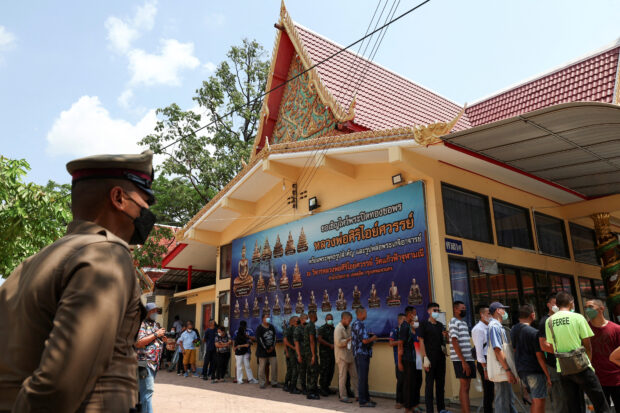What is Thailand’s royal defamation law?

Voters stand in a queue to cast their ballot to vote in the general election at a polling station in Bangkok, Thailand, May 14, 2023. REUTERS/Athit Perawongmetha TPX IMAGES OF THE DAY
Bangkok, Thailand — Thailand’s monarchy is protected by one of the world’s toughest defamation laws, making any criticism of King Maha Vajiralongkorn and the royal household very risky inside the country.
The liberal reformist Move Forward Party won the most seats in May elections, having pledged to soften the law.
But its efforts to form government have been thwarted by Thailand’s military-appointed senators, who are vehemently opposed to any effort that reduces the law’s scope or the onerous prison terms handed down to convicted offenders.
What is the law?
Under Section 112 of Thailand’s penal code, anyone convicted of defaming, insulting or threatening the king, queen, heir or regent faces between three and 15 years in prison on each count.
But the law is routinely interpreted to include criticism of any aspect of the monarchy — including content posted or shared on social media.
Article continues after this advertisementIn the harshest punishment so far, a man was sentenced to 35 years in jail in 2017 for a series of Facebook posts and comments about the royal family.
Article continues after this advertisementLese-majeste crimes have been on the books for more than a century, but were strengthened in 1976.
How is it enforced?
Anyone can make an accusation under the law and authorities are duty-bound to investigate.
There is no transparent disclosure of the official number of lese-majeste complaints, arrests, charges or sentences — only an inconsistent trickle of information from authorities.
The use of Section 112 has risen dramatically since a military coup in 2014.
Self-appointed royalist civilian groups also monitor the web and report alleged violations.
According to legal aid groups, just six people were jailed on lese-majeste convictions before 2014.
That number has skyrocketed since, with 246 people accused of or charged with breaking the law since mid-2020, including 20 minors.
Those charged are almost always convicted, but if they plead guilty sentences are often reduced.
What is punished under the law?
Prosecutors have a broad definition for what counts as defamation of the royal family, with social media posts and satire falling afoul of the law.
An anti-junta activist was convicted in 2017 after posting a news story on Facebook, even though more than 2,000 others had shared the same article.
His two-and-a-half-year sentence was cut short when the king pardoned him in 2019.
Another man was prosecuted in 2015 for satirical comments he made about the favourite dog of Bhumibol Adulyadej, Vajiralongkorn’s father and the reigning monarch at the time.
There is no comparative research that shows which countries use royal defamation laws the most, but historian David Streckfuss says Thailand’s prosecution rate had made the kingdom “the leader” since 2006.
Can the media report on it?
Domestic and international media must exercise strict caution in their reporting of lese-majeste cases and the monarchy in general or risk prosecution.
Even detailed reports on issues such as demands from pro-democracy protesters could put reporters at risk.
Readers who share the news could also face prosecution, and even repeating or summarising the details of Section 112 charges could be interpreted as a violation.
Why is the law in the spotlight?
The Move Forward Party, which won the most seats in May’s election, has pushed for reforms to the law to soften criminal punishments.
But leader Pita Limjaroenrat’s efforts to form government failed when senators, appointed by the military, roundly refused to endorse his nomination as prime minister.
Those lawmakers, and Thailand’s conservative political establishment more broadly, consider the party’s pledge to soften Section 112 a red line.
The Constitutional Court has also agreed to hear a case alleging that the reform promise amounted to an attempt to “overthrow” the constitutional monarchy — one of two cases that could see Pita disqualified from parliament.
Pita has said he will withdraw from consideration if a second vote on his candidacy fails on Wednesday, opening the way for a replacement that can secure senate support by leaving the status quo in place.